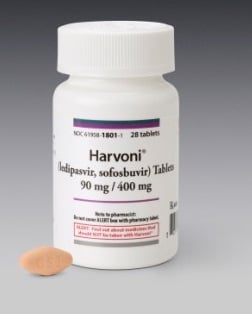
Two patients in Washington state are suing insurers for restricting their access to the latest hep C treatments, the newest episode in the saga over hep C pricing as insurers grapple with the meds' costs and often limit coverage as a result.
Plaintiffs David Morton and R.K. filed class action lawsuits in Seattle's King County Superior Court, claiming that insurers Group Health Cooperative and BridgeSpan only agreed to cover next-generation hep C treatments including Gilead's ($GILD) Harvoni for patients with severe liver damage and with other existing conditions such as HIV. Morton and R.K. are still in early stages of the disease, and now they have to wait to get treatment under their health plan's coverage policies because the insurers think the meds are too expensive to cover, lawyers for the plaintiffs said in a statement.
Hep C meds such as Gilead's Harvoni and Sovaldi come with the promise of a cure. But some insurers still question whether the treatments are worth covering given their high costs. Harvoni, for example, runs at about $95,000 for a 12-week treatment course before discounts. And Sovaldi, Gilead's first-to-market hep C treatment, has an $84,000-per-patient sticker price.
Some health plans have sticker shock and are only agreeing to cover the treatments for the sickest patients. And some Medicaid programs have taken things a step further, refusing to cover the meds at all for patients with hep C.
"With both private and public insurers, the issue comes down to the requirement that insurance is required to cover medically necessary care," Kevin Costello, litigation director at the Center for Health Law and Policy Innovation at Harvard Law School, said in a statement. "When an insurer limits coverage only to its sickest members, it amounts to an irrational and short-sighted rationing of care. From the perspective of an individual living with HCV who is excluded from the cure, that care is the very definition of 'medically necessary.'"
Meanwhile, the government is taking steps to crack down on hep C pricing. In November, the Centers for Medicare and Medicaid Services (CMS) called on hep C drugmakers including Gilead, AbbVie ($ABBV) and Johnson & Johnson ($JNJ) to lay out pricing options that could help expand coverage for patients on Medicaid programs. The agency also put some pressure on states to make sure people have access to the drugs. "As the agency works with states on these matters, now and in the future, we cannot do that without addressing affordability concerns," the CMS said at the time.
Last week, the Massachusetts attorney general threatened Gilead with legal action if it doesn't bring down prices for its hep C blockbusters Sovaldi and Harvoni. Attorney General Maura Healey said in a letter to Gilead CEO John Martin that the drugs' list prices "may constitute unfair trade practice" that violates state law. And the office is considering slapping the California-based company with a lawsuit alleging unfair commercial conduct for its price-setting ways.
Gilead has patient assistance in place for its hep C superstars, but it restricted the program last summer to exclude patients whose insurance limits coverage of the meds. Gilead, which reported Q4 earnings on Tuesday actually saw sales of Sovaldi and Harvoni in the U.S. decline about 25% to $2.367 billion from $3.179 billion in the quarter a year ago, in part because of tight controls by public payers. But the drugs continued to rake in revenues across the world, reaching $19.1 billion in sales for the year--a 54% jump from 2014.
- read the release (PDF)